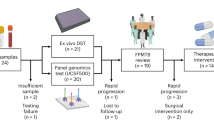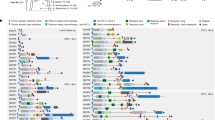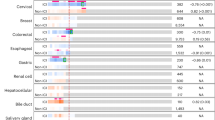Abstract
While germline and somatic mutations in the gene PTPN11, encoding a phosphatase which regulates the RAS signaling pathway, are well characterized in children with Noonan syndrome and juvenile myelomonocytic leukemia, less is known about their clinical impact in adults with acute myeloid leukemia (AML). To elucidate the effect of PTPN11 mutations (PTPN11mut) on clinical outcomes, we screened adult patients with AML treated at our institution using targeted next-generation sequencing. Among 1406 consecutive patients, 112 (8%) had PTPN11mut. These mutations were more commonly associated with the acute myelomonocytic/monocytic leukemia subtype than was wild-type PTPN11, while none were detected in patients with core-binding factor AML. They co-occurred more commonly with NPM1 mutations and FLT3 internal tandem duplications and less commonly with mutations in IDH2 and a complex karyotype. Compared with the wild-type allele, PTPN11mut was associated with lower complete response rates (54% vs 40%; P = 0.04), and shorter overall survival (median 13.6 vs 8.4 months; P = 0.008). In a multivariate analysis, PTPN11mut independently increased the risk of death, with a hazard ratio of 1.69 (95% CI, 1.25–2.29; P = 0.0007). In summary, mutations in PTPN11 have a characteristic phenotype in adults with AML and are associated with an adverse prognosis.
This is a preview of subscription content, access via your institution
Access options
Subscribe to this journal
Receive 12 print issues and online access
$259.00 per year
only $21.58 per issue
Buy this article
- Purchase on Springer Link
- Instant access to full article PDF
Prices may be subject to local taxes which are calculated during checkout



Similar content being viewed by others
References
Papaemmanuil E, Gerstung M, Bullinger L, Gaidzik VI, Paschka P, Roberts ND, et al. Genomic classification and prognosis in acute myeloid leukemia. N Engl J Med. 2016;374:2209–21. Jun
Pandey R, Saxena M, Kapur R. Role of SHP2 in hematopoiesis and leukemogenesis. Curr Opin Hematol. 2017;24:307–13. Jul
Chen L, Chen W, Mysliwski M, Serio J, Ropa J, Abulwerdi FA, et al. Mutated Ptpn11 alters leukemic stem cell frequency and reduces the sensitivity of acute myeloid leukemia cells to Mcl1 inhibition. Leukemia. 2015;29:1290–300. Jun
Nabinger SC, Li XJ, Ramdas B, He Y, Zhang X, Zeng L, et al. The protein tyrosine phosphatase, Shp2, positively contributes to FLT3-ITD-induced hematopoietic progenitor hyperproliferation and malignant disease in vivo. Leukemia. 2013;27:398–408. Feb
Hui E, Cheung J, Zhu J, Su X, Taylor MJ, Wallweber HA, et al. T cell costimulatory receptor CD28 is a primary target for PD-1-mediated inhibition. Science. 2017;355:1428–33. 03
Jongmans MC, van der Burgt I, Hoogerbrugge PM, Noordam K, Yntema HG, Nillesen WM, et al. Cancer risk in patients with Noonan syndrome carrying a PTPN11 mutation. Eur J Hum Genet. 2011;19:870–4. Aug
Grossmann KS, Rosário M, Birchmeier C, Birchmeier W. The tyrosine phosphatase Shp2 in development and cancer. Adv Cancer Res. 2010;106:53–89.
Niemeyer CM, Flotho C. Juvenile myelomonocytic leukemia: who’s the driver at the wheel? Blood. 2019;133:1060–70. Mar
Hou HA, Chou WC, Lin LI, Chen CY, Tang JL, Tseng MH, et al. Characterization of acute myeloid leukemia with PTPN11 mutation: the mutation is closely associated with NPM1 mutation but inversely related to FLT3/ITD. Leukemia. 2008;22:1075–8. May
Andrade FG, Noronha EP, Brisson GD, Dos Santos Vicente Bueno F, Cezar IS, Terra-Granado E, et al. Molecular characterization of pediatric acute myeloid leukemia: results of a multicentric study in Brazil. Arch Med Res. 2016 Nov;47:656–67.
Yamato G, Shiba N, Yoshida K, Hara Y, Ohki K, Okubo J, et al. Clinical features and prognostic impact of RUNX1 and PTPN11 mutations in pediatric acute myeloid leukemia—the JCCG study, JPLSG AML-05. Blood. 2017;130:1415–1415.
Madanat YF, Sekeres MA, Al-Issa K, Hirsch CM, Mukherjee S, Gerds AT, et al. Distinct genomic associations to predict acute myeloid leukemia (AML) progression from myelodysplastic syndromes (MDS). Blood. 2017;130:4245–4245.
Luthra R, Patel KP, Reddy NG, Haghshenas V, Routbort MJ, Harmon MA, et al. Next-generation sequencing-based multigene mutational screening for acute myeloid leukemia using MiSeq: applicability for diagnostics and disease monitoring. Haematologica. 2014;99:465–73. Mar
Xu J, Jorgensen JL, Wang SA. How do we use multicolor flow cytometry to detect minimal residual disease in acute myeloid leukemia? Clin Lab Med. 2017;37:787–802. Dec
Stelljes M, Beelen DW, Braess J, Sauerland MC, Heinecke A, Berning B, et al. Allogeneic transplantation as post-remission therapy for cytogenetically high-risk acute myeloid leukemia: landmark analysis from a single prospective multicenter trial. Haematologica. 2011;96:972–9. Jul
Chan RJ, Feng GS. PTPN11 is the first identified proto-oncogene that encodes a tyrosine phosphatase. Blood. 2007 Feb;109:862–7.
Eisfeld A-K, Kohlschmidt J, Mrózek K, Mims AS, Walker CJ, Nicolet D, et al. Additional gene mutations refine the 2017 European Leukemianet (ELN) classification of adult patients (Pts) with De Novo acute myeloid leukemia (AML) aged <60 years: an analysis of alliance for clinical trials in oncology (Alliance) studies. Blood. 2018;132:2740–2740.
Kaner JD, Mencia-Trinchant N, Schaap A, Roboz GJ, Lee S, Desai P, et al. Acute myeloid leukemia (AML) with somatic mutations in PTPN11 is associated with treatment resistance and poor overall survival. Blood. 2018;132:2760–2760.
Loh ML, Reynolds MG, Vattikuti S, Gerbing RB, Alonzo TA, Carlson E, et al. PTPN11 mutations in pediatric patients with acute myeloid leukemia: results from the Children’s Cancer Group. Leukemia. 2004;18:1831–1834. Nov
Tartaglia M, Martinelli S, Iavarone I, Cazzaniga G, Spinelli M, Giarin E, et al. Somatic PTPN11 mutations in childhood acute myeloid leukaemia. Br J Haematol. 2005;129:333–9. May
Mohi MG, Williams IR, Dearolf CR, Chan G, Kutok JL, Cohen S, et al. Prognostic, therapeutic, and mechanistic implications of a mouse model of leukemia evoked by Shp2 (PTPN11) mutations. Cancer Cell. 2005;7:179–91. Feb
Duployez N, Marceau-Renaut A, Boissel N, Petit A, Bucci M, Geffroy S, et al. Comprehensive mutational profiling of core binding factor acute myeloid leukemia. Blood. 2016;127:2451–9. 05
Faber ZJ, Chen X, Gedman AL, Boggs K, Cheng J, Ma J, et al. The genomic landscape of core-binding factor acute myeloid leukemias. Nat Genet. 2016;48:1551–6. 12
Sun X, Ren Y, Gunawan S, Teng P, Chen Z, Lawrence HR, et al. Selective inhibition of leukemia-associated SHP2(E69K) mutant by the allosteric SHP2 inhibitor SHP099. Leukemia. 2018;32:1246–9.
Fu JF, Liang ST, Huang YJ, Liang KH, Yen TH, Liang DC, et al. Cooperation of MLL/AF10(OM-LZ) with PTPN11 activating mutation induced monocytic leukemia with a shorter latency in a mouse bone marrow transplantation model. Int J Cancer. 2017;140:1159–72. Mar
Zhang H, Wilmot B, Bottomly D, Kurtz SE, Eide CA, Damnernsawad A, et al. Biomarkers predicting venetoclax sensitivity and strategies for venetoclax combination treatment. Blood. 2018;132:175–175.
Stevens BM, Jones CL, Winters A, Dugan J, Abbott D, Savona MR, et al. PTPN11 mutations confer unique metabolic properties and increase resistance to venetoclax and azacitidine in acute myelogenous leukemia. Blood. 2018;132:909–909.
Han L, Qiu P, Jorgensen JL, Mak D, Burks JK, McQueen T, et al. Single-cell mass cytometry characterizes phenotypic and functional heterogeneity in acute myeloid leukemia at diagnosis, in remission and relapse. Blood. 2018;132:912–912.
Tambe M, Karjalainen E, Vaha-Koskela M, Heckman CA, Porkka K, Wennerberg K. Paradox-breaker Pan-RAF inhibitors induce an AML-specific cytotoxic response and synergize with venetoclax to display superior antileukemic activity. Blood. 2018;132:2210–2210.
Chen YN, LaMarche MJ, Chan HM, Fekkes P, Garcia-Fortanet J, Acker MG, et al. Allosteric inhibition of SHP2 phosphatase inhibits cancers driven by receptor tyrosine kinases. Nature. 2016;535:148–52. 07
Acknowledgements
This work was supported in part by the National Institutes of Health/National Cancer Institute through MD Anderson’s Cancer Center Support Grant P30 CA016672 and the MD Anderson Cancer Center Leukemia SPORE P50 CA100632; by the Charif Souki Cancer Research Fund; and by generous philanthropic contributions to the MD Anderson Moon Shots Program. GCI has received funding through the National Cancer Institute K12 Paul Calabresi Clinical Scholarship Award (NIH/NCI K12 CA088084). Editorial support was provided by Amy Ninetto in Scientific Publications, Research Medical Library, The University of Texas MD Anderson Cancer Center.
Author information
Authors and Affiliations
Contributions
MA, GCI, GB, and HK analyzed the data and wrote the article. MA, GCI, SP, and FW compiled and summarized the data. XW provided statistical support and analysis. MA, GCI, and FG analyzed the genomic data. KP performed next-generation sequencing and analysis. JC, FR, TK, ND, GGM, CD, NP, HK, and GB enrolled patients.
Corresponding author
Ethics declarations
Conflict of interest
The authors declare that they have no conflict of interest.
Additional information
Publisher’s note Springer Nature remains neutral with regard to jurisdictional claims in published maps and institutional affiliations.
Supplementary information
Rights and permissions
About this article
Cite this article
Alfayez, M., Issa, G.C., Patel, K.P. et al. The Clinical impact of PTPN11 mutations in adults with acute myeloid leukemia. Leukemia 35, 691–700 (2021). https://doi.org/10.1038/s41375-020-0920-z
Received:
Revised:
Accepted:
Published:
Issue Date:
DOI: https://doi.org/10.1038/s41375-020-0920-z
This article is cited by
-
SHP2 clinical phenotype, cancer, or RASopathies, can be predicted by mutant conformational propensities
Cellular and Molecular Life Sciences (2024)
-
Molecular profiling and clinical implications of patients with acute myeloid leukemia and extramedullary manifestations
Journal of Hematology & Oncology (2022)



